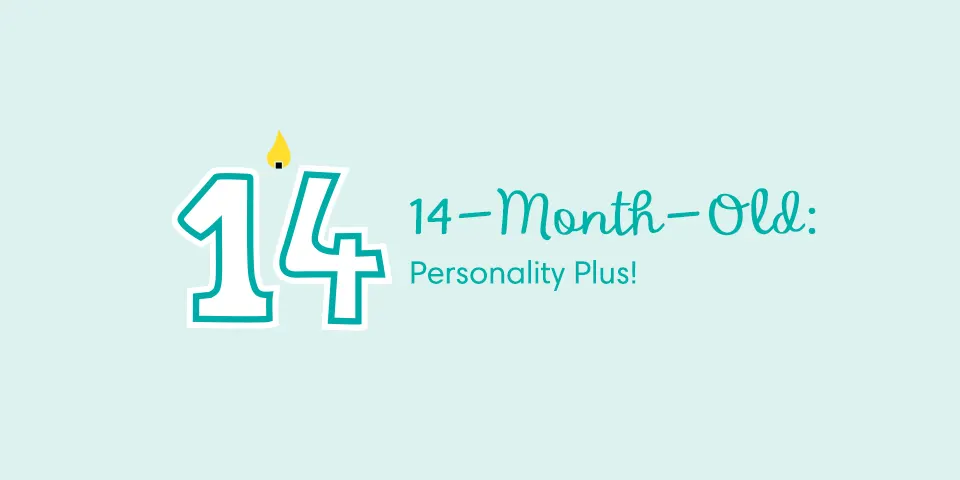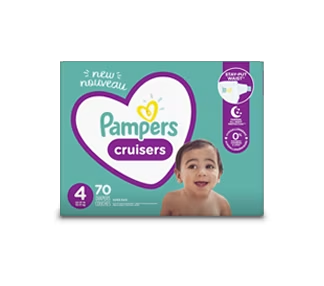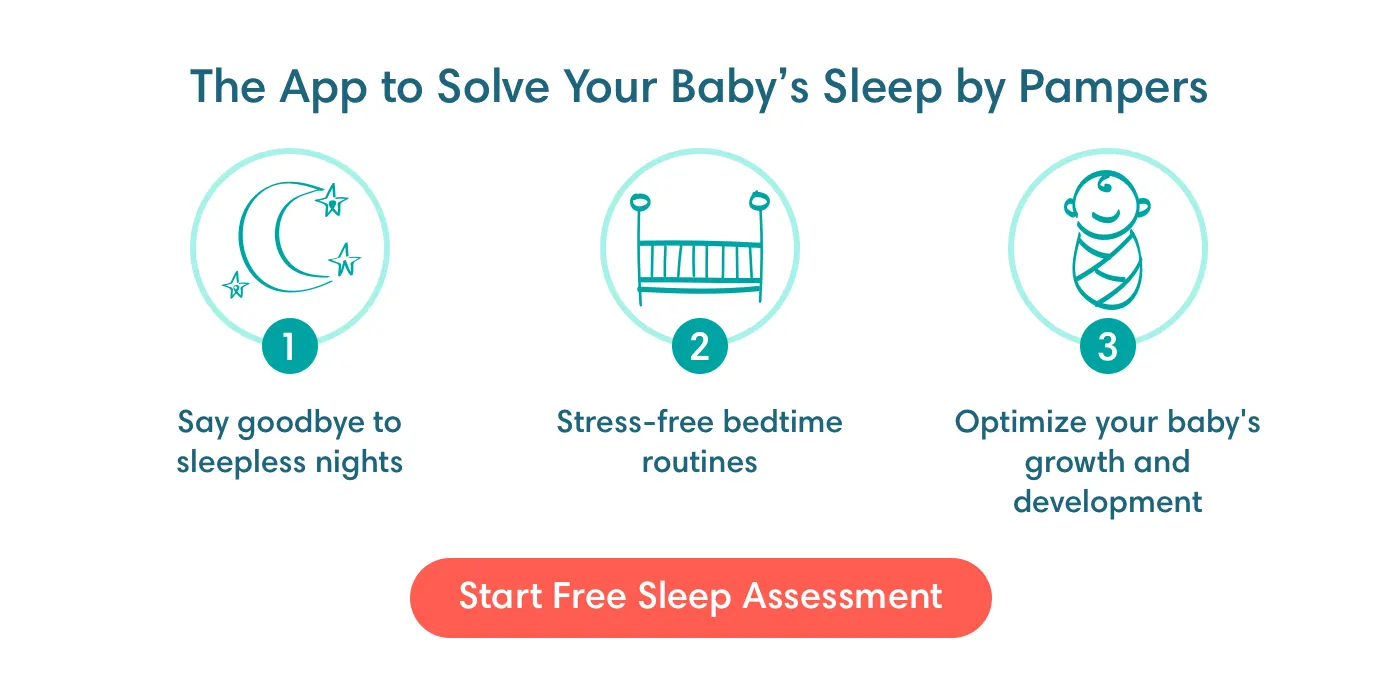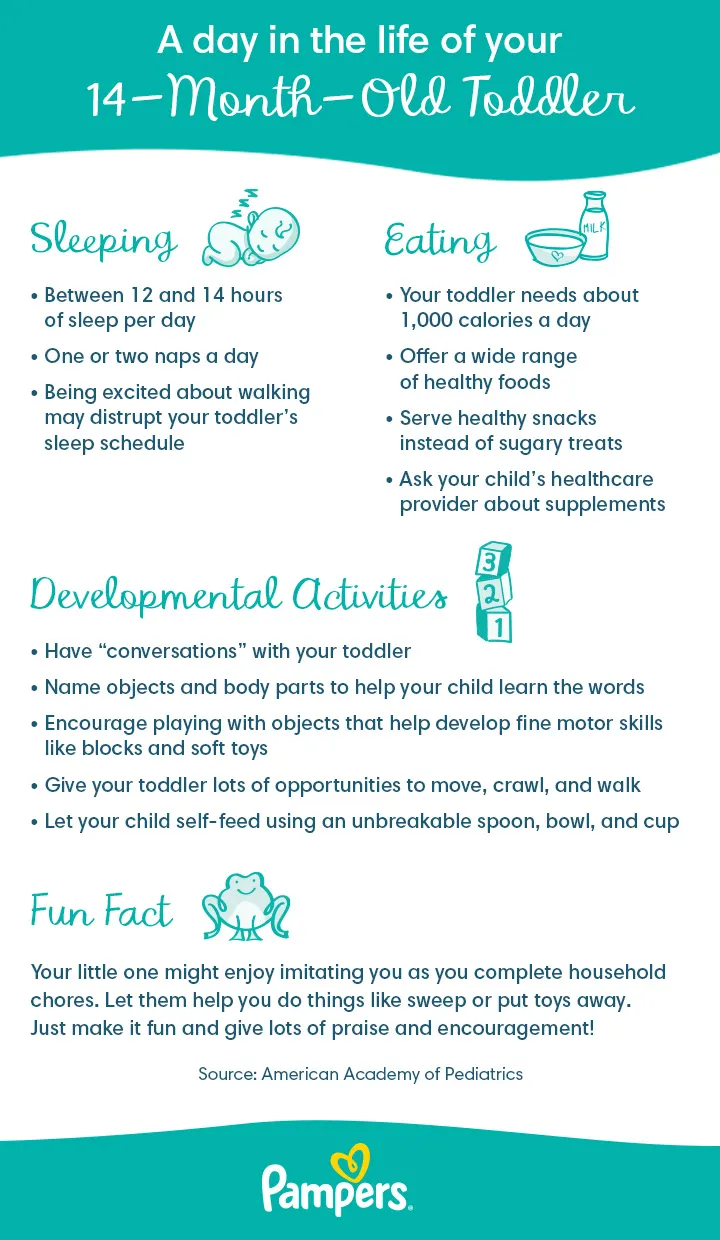14-Month-Old: Entering Toddlerhood
Your 14-month-old baby is not so little anymore! In fact, at 14 months old, you’ve got a toddler on your hands, and one who is revealing more personality by making decisions, showing preferences, and gaining independence. Life is full with a toddler in the house, and this month is no exception. Keep reading to discover what 14-month-old milestones to anticipate, plus advice on sleep regression, nap schedules, eating habits, sibling dynamics, and more.
Toddler Development: 14-Month Milestones
Children develop at different rates, which you’ll probably notice more if you have an older child or are connecting with other parents of young children. For example, your 14-month-old’s weight percentile and height may differ from others, which is normal and expected, as each child is special and unique. Therefore, the 14-month milestones listed below vary from child to child. Speak to your toddler’s healthcare provider if you’re ever concerned about their development.
These are some general areas of development and achievement you may observe in your 14-month-old toddler:
Language comprehension. Have you noticed that your little one can point to their favourite toy if you ask them to do so? Or that your toddler is waiting by their highchair when you announce that snack time is almost ready? This change happens as your toddler starts understanding more of what you say. It’s perfectly normal if your 14-month-old is not talking yet, but to help boost comprehension and language development, keep the “conversation” flowing by narrating what’s happening around you, speaking slowly and clearly, and using simple words and short sentences.
Flashes of independence and dependence. You might find your 14-month-old becoming bolder and more confident this month. Perhaps your child will walk away from you to do something you’ve just told them not to do or play on their own in a more independent way than before. At other times, your little one might seem especially clingy. The transition toward greater independence is not linear, and this push-pull between wanting to be an individual person and needing to be right next to you is normal. Support your toddler by offering reassurance and don’t try to force them to do anything they don’t want to do in any given moment.
Separation anxiety. It's not unusual for a 14-month-old to put up a fuss when you leave. One strategy that may help reduce separation anxiety is to let your toddler know what's happening: you're going, you’ll soon return, and you love them. Don’t sneak off, as this can make your child fearful that you’ll disappear at any time. Plus, try not to reveal any anxiety of your own about the separation. Once you return, give your toddler lots of attention. In time, they’ll understand that you’ll always return and that leaving doesn’t mean they’re not loved.
Self-feeding. Your little one is getting better and better at self-feeding with a spoon or fingers, and drinking from a cup, too. Unbreakable dishes and cups are a good idea, as your little one may drop or even throw them from time to time. If your toddler does throw something like dishes or cutlery across the room, reinforce the rules quickly and put things back where they belong. One of the many 14-month milestones includes trying to get you to react, which may involve dropping things. If the behaviour continues, it might be a good idea to pause mealtime and give your child a chance to calm down before resuming.
Toddling. If your 14-month-old is walking, this may look quite different from the way older children and adults walk. At this stage, toddlers step with a wide gait, toes pointed outward, and the steps can be shaky. Your child may seem to lurch forward from one foot to the other, with arms bent at shoulder height for balance. It all looks very tentative and slow right now—particularly when losing balance and falling—but it won’t be long before you’ll be running to catch up! And if your 14-month-old is not pulling up to stand and walk or hasn’t yet taken their first steps, don't worry. This is a development milestone that’s unique to everyone, and one that will likely be reached in the next few months.
Illnesses. Although you’ll probably see more common colds and flus during the baby months, your toddler may also still feel ill from time to time. What’s most important is keeping an eye on your little one’s temperature when they feel sick. For children, including 14-month-old toddlers, a temperature over 38 degrees Celsius indicates an average fever, but if it’s 39 degrees Celsius or higher, contact your baby’s healthcare provider straight away.
The 14-month-old milestones you’ll celebrate will bring big and small changes from one month to the next, but there’s one thing that will remain constant for a while—diapers! You deserve a reward for all those diaper changes you’re doing. Download the Pampers Club App and get rewards for all your Pampers purchases.
How to Support Your 14-Month-Old’s Milestones
These are just some of the activities for supporting your 14-month-old’s development:
Involve your toddler in routine tasks. Toddlers love to imitate and be included in family life, so let your little helper assist with simple jobs around the house. There are plenty of fun activities for 14-month-olds out there, but you may be surprised that helping you brings just as much joy as playing games! For example, put some music on and work together to put toys into the toy basket. The aim is to make this task fun and not a chore, so give lots of time, help your little one complete the task, and praise them for a job well done. Other ideas include your toddler
putting the milk away in a low shelf of the fridge
using a dustpan and brush to “sweep” the floor
pouring cereal or crackers into a bowl.
Encourage social interactions. You may find that your 14-month-old enjoys being with other children, especially those who are a little older. Most commonly, toddlers play alone but alongside another child, which is called parallel play. This type of interaction is in contrast to playing directly with that child—the skills to do that will come later. Likewise, sharing isn’t really something your 14-month-old will be thinking about yet, and they may get upset if another child takes something.
Use real words. Given your little one is starting to understand much more of what you say, it's best to use actual words instead of made-up ones as much as possible. For example, when you're reading a book with a picture of a sheep, say “sheep” and not “baa baa” when you point to the animal.
Provide appropriate discipline. Discipline is less about punishing and more about teaching and guiding your 14-month-old through behavioural milestones. At this stage, and in the coming years, your little one will test boundaries and discover limits. Remember that it’ll likely take years of firm (but loving) and consistent limit setting on your part. Eventually, though, your little one will learn the behaviour you expect and develop self-discipline.
Tip It helps for both parents to be on the same page about what behaviour boundaries to set, so have a discussion with your partner (or your child’s other parent or guardian) to clarify your approach. Setting boundaries consistently together helps your little one learn the limits more easily. |
14-Month-Old Eating: Mealtimes and Menus Ideas
Your 14-month-old might not be eating as much as you expect—they’ll only need about 1,000 calories per day, which they can get with three small meals and two hearty snacks. The key is to offer nutritious selections from the main food groups: protein foods like meat and eggs, dairy products like cow’s milk and cheese, fruits and vegetables, and wholegrain cereals, pasta, or bread. If your little one is a fussy eater, you’re not alone! It’s common for babies and toddlers to be picky eaters, so check out some suggestions for feeding a picky toddler.
Tip Although a varied diet of healthy foods usually provides enough vitamins and minerals for most children, some children may need supplements. Talk to your child’s healthcare provider about supplements like vitamins B2, B12, and calcium, especially if your family follows a strict vegetarian or vegan diet. And if your hungry 14-month-old mostly prefers lots of cow’s milk (much more than about 24 to 32 ounces a day), their provider may recommend an iron supplement. |
14-Month-Old Sleep Regression and Sleep Schedule
Your 14-month-old probably needs about 12 to 14 hours of sleep a day. At this stage children may be down to a single daily nap, as about half of all toddlers are by 15 months. If your toddler has recently started walking, you might find that they have a hard time winding down at naptime or bedtime, given the excitement of exploring the world on two feet. Exciting developmental milestones could cause a little bout of sleep regression in your 14-month-old, which is normal. You may even find your little one walking back and forth in their crib as they practice this new skill repeatedly!
Because a 14-month-old’s sleep schedule can vary for the aforementioned reasons, experts recommend simply watching for signs of crabbiness and adjust the schedule as needed. In time, the novelty of walking will wear off and your child will be easier to settle, fall asleep, and stay asleep. And, eventually, your 14-month-old’s schedule will get back to “normal”.
A Day in the Life of Your Toddler
Life with a 14-month-old is never dull. Here’s what a typical day might include at your house:
Your Toddler’s Health: Keeping Safe Outside
As your toddler becomes more mobile, it’s important to hold their hand and keep an eye on them, particularly when you’re out and about together. Some helpful tips on keeping your 14-month-old safe while exploring the outside world include the following:
Be careful in public places, near roads, and by water. Don’t let your child dart away from you in the grocery store, and be particularly vigilant when near cars, such as on the street or in a parking lot. Be very careful anywhere around water, too. These are some of the most dangerous areas outside the home for young children.
Hold hands. Because your little one can wander off in an instant, the best strategy is to always hold their hand. If your child tries to wriggle free, explain why it’s important by saying something like “I know you want to look over there, but I need to hold your hand to make sure you’re safe.”
Lock doors and gates. You might also want to install extra locks to doors and gates, as well as baby gates or even alarms, to ensure your toddler can’t get out of the house without your knowledge. It’s especially important that the pool and driveway are inaccessible to your 14-month-old.
Double check behind the car. Although many new cars come with a rear visibility system or an alarm that can detect movement behind the car, always double check that your toddler is not behind you as you back out of the driveway.
Keep your car locked. When it comes to car safety, be sure keep your car locked at all times, even when it’s in the garage. This helps prevent your curious 14-month-old from getting into the car and accidentally setting it in gear, becoming trapped in the car, or getting injured.
Your Life as a 14-Month-Old’s Parent: Sibling Dynamics
If you have older children, one thing to anticipate as your 14-month-old baby enters toddlerhood is a slight change in sibling dynamics. At this age, toddlers tend to be the center of their own universe, and this can make them behave in ways that your older children may find annoying. For example, your 14-month-old might infringe on their siblings' privacy, take things as their own, and cry when not being able to play with others’ toys. On the other hand, your older children may be jealous that your 14-month-old naturally gets more of your attention. This natural sibling rivalry should diminish in the years to come as your children need less of your focused attention. In the meantime, try to make an effort to spend some quality time with each of your children. Perhaps have your partner, family member, or babysitter mind one while you enjoy some one-on-one time or a fun outing with the other, and vice versa. If you’re planning to move your 14-month-old to a shared room in the future, read our tips on creating a room for your toddler and older child to share.
FAQS AT A GLANCE
Every child develops at a different pace, but some typical 14-month milestones include:
- Saying a few basic words like “mama”
- Understanding simple words and following simple requests like “wave at daddy”
- Pointing to a body part or favourite toy when asked to
- Walking and climbing up on furniture
- Imitating simple household activities like sweeping.
Checklist for This Month
With so many exciting 14-month milestones to anticipate, we created a short checklist to help you prepare for your little one’s development:
Coordinate with your partner about how you communicate around your toddler. You may find this has already happened organically, but now that your toddler understands more of what you say, you may want to agree with your partner to spell out certain words so that your 14-month-old can’t understand. For example, “Time for the P-L-A-Y-G-R-O-U-N-D?” You may also want to remind each other to watch what you say around your little one, so that their growing vocabulary doesn’t accidentally include something a little more colourful than you’d like.
Arrange for your child’s first haircut. If your toddler’s locks are getting quite long, it may be time for your baby’s first haircut! Of course, some children may have already had a trim and others may still need to wait a bit.
Create a dinner ideas list and meal plan. As life gets busier at your home, you may find it helpful to create a weekly meal plan. This way you’ll know exactly what to buy and make. You might also like to keep a list of healthy and family-favourite meals as fallbacks when you’re lacking creativity.
Schedule the 15-month well-child visit. At this checkup, your toddler’s healthcare provider will weigh and measure your child, checking their growth against the standard growth charts. As part of the exam, your provider will check your little one's vision, listen to their heart and lungs, and assess motor skills and behaviour, as well as review sleeping and eating habits. Review your child’s immunization schedule ahead of time to prepare for any booster shots.
The information in this article is based on the expert advice found in trusted medical and government sources, such as the American Academy of Pediatrics and the American College of Obstetricians and Gynecologists. You can find a full list of sources used for this article below. The content on this page should not replace professional medical advice. Always consult medical professionals for full diagnosis and treatment.
14 month old baby - checklist







